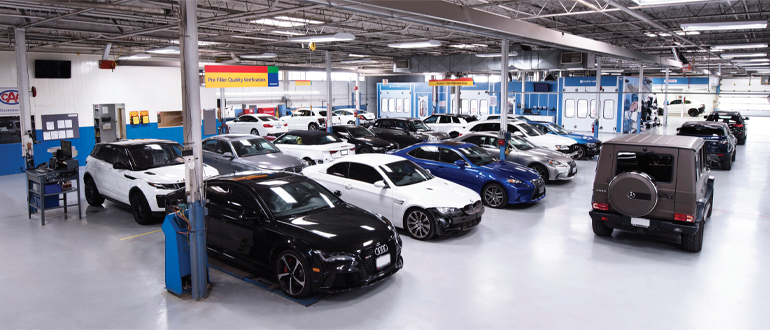The question of OEM Certifications
By Maddy Kylie
The automotive industry is an industry like no other. Ripe with innovation and backed by some of the world’s greatest minds, it is a landscape that is constantly evolving.
Over the past few years, the industry has made some of the biggest changes yet—cue electric and autonomous vehicles. This boom in technologically advanced vehicles has made following OEM Repair Procedures more important than ever and, along with it, OEM Certification programs have taken off.
In the eyes of Leanne Jefferies from Certified Collision Care, which manages and administers OEM Certifications for 11 vehicle brands in Canada, there are many benefits to achieving OEM certifications.
“Shops can qualify for multiple OEM certifications with the same tools, equipment and training, eliminating redundancy and making the process affordable and efficient. The certification requirements reflect what is needed to properly and safely repair vehicles.” William Monteith, general manager of Barrie, Ontario’s CSN Zenetec Collision, which touts 15 OEM certifications says the main benefits of getting OEM certified is the first-hand knowledge and training “that you just can’t get anywhere else.”
Adding that OEM certifications, gives the repairers peace of mind knowing that each vehicle is being fixed properly. “It’s great support for the technicians to see exactly where you’re supposed to join panels, where to weld, how many welds, and the materials to use when welding and what equipment to use. So, it’s very specific and it’s very well put together and the overall quality of repair at the end of it, is the best.” Similarly, Lorenzo D’Alessandro, owner of four shops in the GTA, CSN 427 Auto, Avenue, CSN Heartland and Mercedes-Benz 427 Auto, says it’s very important that the vehicles coming into their shops “are being fixed the way they were designed to be fixed.”
Obtaining OEM certifications is also a great way to gain exposure. “OEM Certified shops gain access to valuable marketing tools. This includes signage for their office, and OEM certified logos that can be displayed on their websites, business cards, marketing materials, social media and advertisements. Shops can promote their credentials in their community, with fleet accounts, insurance brokers, insurance partners and their customer base,” says Jefferies
Adding that OEMs refer consumers to certified shops through their online shop locators, roadside assistance services, and through dealer referrals. Some insurers also take OEM certifications into consideration when referring customers to a shop.
As with any endeavour, it’s not all sunshine and roses. While OEM Certifications boast a host of benefits, Andrew Shepard, senior director, Industry Programs; Executive Director, I-CAR Canada says contrary to popular belief, obtaining OEM certifications doesn’t necessarily mean an increase in customers.
“I haven’t seen any evidence yet that [OEM certifications] lead to an increase in volume for the shop participating in said programs.” He says while there are a lot of benefits to becoming an OEM certified shop, the equipment requirements can be a bit tricky to navigate. “It’s relatively easy for shops to participate, except where the OEs require substantially different equipment,” he said. “Certain OEMs, such as Volkswagen, require one of two brands of welders and then a shop that already has half a dozen welders would have to go out and add two more.” Having to purchase OE-specialized equipment for certain brands, on top of training and annual renewal fees, can add up quickly. D’Alessandro says OEM certified shops will spend up to 30 to 40 thousand a year on training for each OEM certification they obtain and about 250 thousand on equipment. Similarly, Monteith says OEM certifications are a massive investment.
“It’s hard to put out the money that the OEs require— for as many brands as we have— for it to make sense. We do lots of volume, so we can but it’s still a huge investment. I’ve got a line on my P&L for certification training and equipment and it’s become a cost centre in itself,” said Monteith. But with more and more electric and autonomous vehicles on the way, getting OEM certified might be the new norm—like it or not. Certification continues to gain momentum in Canada. Most OEMs now have a certification program with over 20 percent of shops participating in one or more programs, says Jefferies.
“This movement towards certification has increased the technical capability of the industry, providing benefits to all stakeholders, and ensuring consumer safety is protected.”
D’Alessandro says soon vehicles will become so technologically advanced that shops will have “no choice” but to become OEM certified. CSN Zenetec also continues to obtain OEM certifications, despite the cost because they want to stay ahead of the curve and prepare for the future. Sheppard urges shops to do what’s best for them, if that means getting OEM certified then they should do it, if not, they should look at other options. “If there is an ROI pursue it.”

Andrew Shepherd says, contrary to popular belief, obtaining OEM certifications doesn’t necessarily mean an increase in customers.

Leanne Jeffries, vice president for Assured Performance Network’s Certified Collision Care sees many benefits to OEM certifications.

Lorenzo D’Alessandro, owner of several GTA-based CSN collision centres, says shops will soon have “no choice” but to be OEM certified.

Despite the cost of obtaining OEM certs, CSN Zenetec—which touts 15 approvals—feels its necessary to stay ahead of the curve.














